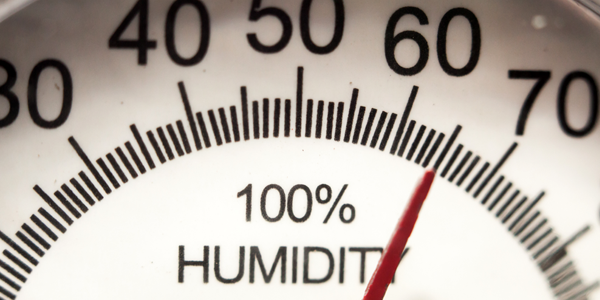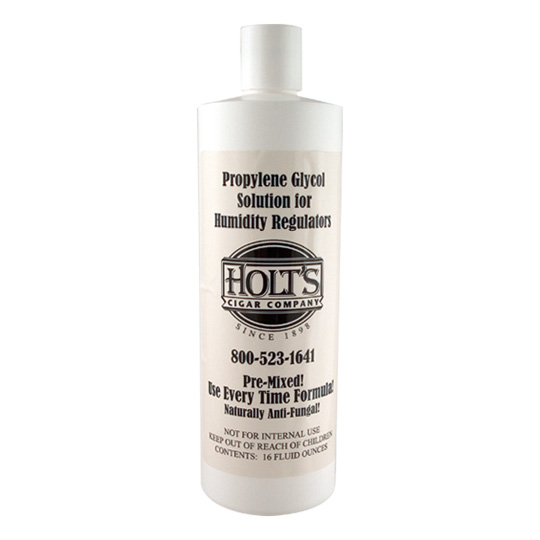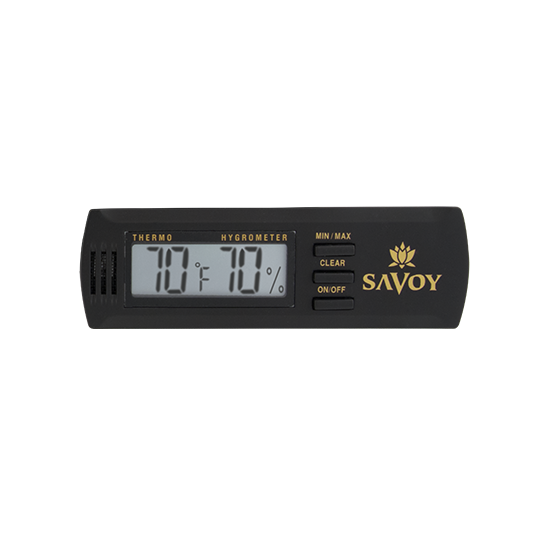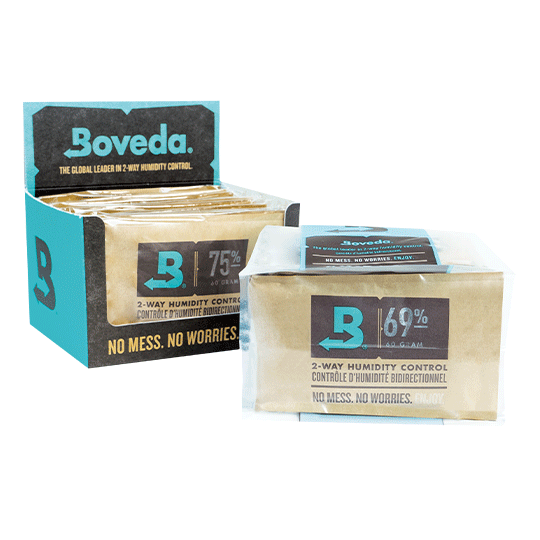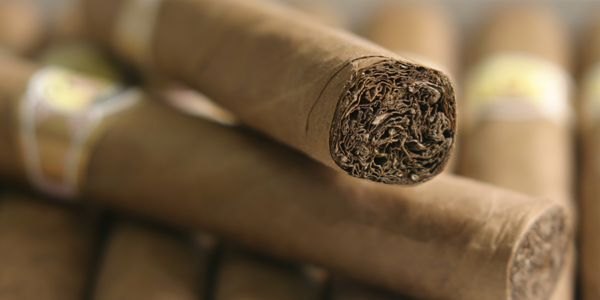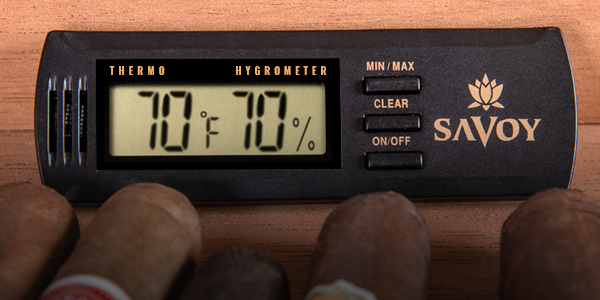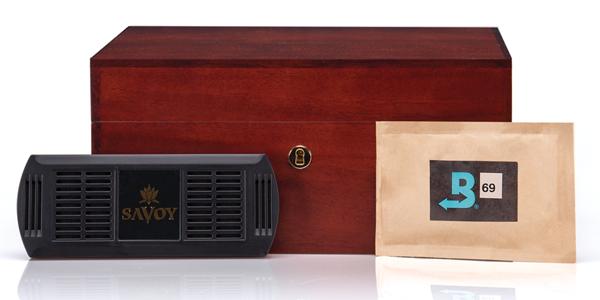Why Does Humidity Matter When Storing Cigars?
If you’ve ever smoked a premium handmade cigar that’s dried out, the critical role humidity plays in preserving your cigars is apparent. Dry cigars burn hot and fast and worst of all, they taste bitter. Premium cigars are hygroscopic, meaning they absorb moisture from the environment they’re stored in. They also lose moisture easily when humidity is deficient or they’re left out of a humidor.
Handmade cigars contain 12-15% moisture when they leave the factory. They need to sustain the same moisture level to preserve their intended flavor. That’s why cigars are stored in humidors. Once a cigar loses its moisture, it can often be rehumidified. However, its original flavor cannot be replaced after the humidity dissipates. The blend of the binder, filler, and wrapper tobaccos that comprise a cigar are assembled by the cigar roller in a specific ratio to achieve a consistent density and taste. Moisture is an essential component in a cigar’s makeup. Too little or too much moisture interrupts a cigar’s flavor and its burn.
Geography Matters
Premium tobacco is grown in warm, humid climates around the world. It’s harvested, fermented, aged, and assembled into cigars in the same warm and humid regions. Cigars are consumed, however, in many different environments. When cigars are shipped far away from their tropical origins, recreating a climate similar to the farms and factories where they’re produced is the main function of a humidor. Cigars can be stored indefinitely in the right circumstances.
Many cigar lovers follow the 70/70 rule for storing their cigars. Store your cigars at 70% RH (relative humidity) and 70 degrees Fahrenheit. While the 70/70 rule is sound general advice, a one-size-fits-all approach does not always work. Geography matters. The seasons make a difference. The climate in your home impacts your cigars, even if they’re in a humidor.
In New Orleans, the average humidity is 76%, while in Las Vegas it’s just 30%. That’s a massive swing. Luckily, storing cigars is not brain surgery, even if you live in a cold weather climate. As long as you monitor your humidity levels with a hygrometer, maintaining a consistent humidity is a straightforward process. There are differences between an analog and digital hygrometer, too. Some prefer the look of an analog gauge, but analog hygrometers need to be calibrated more often for accuracy. That’s why we suggest investing in a digital hygrometer to avoid any guesswork with your humidity.
Also, make sure you’re using distilled water, propylene glycol solution, or the equivalent in you humidity source – NOT tap water.
How to Tell If a Cigar Is Dried Out
Without a steady supply of adequate humidity, cigars dry out. The first and most obvious indication a cigar is dried out is revealed by gently squeezing it with your fingers. If the cigar crackles and the wrapper leaf cracks where you apply slight pressure, it’s too dry. There are ways to reconcile a dry cigar, but be patient. It takes time, often days or weeks, to re-humidify a cigar that’s dried out.
Rehumidifying your cigars is a gradual process. It can’t be rushed. If you inundate your cigars with too much moisture too quickly, they will expand and the wrappers will crack as a result. Introduce low levels of humidity to your cigars, whether in a humidor or a ziplock bag. Choose an appropriate humidification source and expose your cigars to humidity levels in the 50% or low 60% range. Incrementally increase the humidity over a period of days and weeks. When you’re confident your cigars have acclimated to 62-65% humidity for an extended period of time, you can smoke them. You can also continue to rehumidify your cigars until you’ve returned them to 70% RH, but consider 72% the ceiling for premium cigars.
Take note of your cigars at the time of purchase. When you buy cigars from a reputable retailer, they will be fresh and perfectly humidified when you leave the store. If you’ve been rehumidifying dry cigars, gently squeeze them again to verify they reflect the condition they were in when you bought them.
Don’t Over-Humidify Your Cigars
Many connoisseurs argue that 70% RH is too high. Cigars that are too spongy are equally undesirable. Too much moisture promotes mold and beetles, especially when the temperature is over 70 degrees. Cigars that are too humid can deliver a tight or plugged draw and may not burn evenly. Don’t buy into the false notion that “softer” cigars are somehow “fresher.”
Slightly lower temperature and humidity levels, in the mid to low 60s, are the optimal cigar storage conditions for a number of aficionados. While your cigars shouldn’t be brittle or flaky, they’re supposed to be firm. Cooler temps and less aggressive humidity levels encourage consistency in a humidor. Too much fluctuation, especially sudden, is bad for your cigars. Don’t be afraid to dial down the moisture a little and keep your humidor in a room in your house that’s cooler. Smoke a few cigars and note the difference in taste and aroma they exhibit versus when you’ve got the humidity cranked up.
Storing Your Cigars for a Long Period of Time
Cigars age just like wine. The oils from the wrapper, binder, and filler tobaccos meld with one another and change over time. Your cigars will age differently if you leave the cellophane on (many take it off) when you place your cigars in your humidor. Leaving the cigars in their box and placing the entire box in a humidor will also change the way your cigars taste as they mature.
Cigars can peak like wine, too. No two blends will age the same. One cigar may taste amazing after six months or a year, but could become too mellow after two or three years. Other cigars reveal ultra-refined nuances after twenty years in a humidor. Your humidor will impart its own distinctive taste into your cigars based on what cigars you’ve previously stored inside.
For best results, don’t fill your humidor to the gills. Buy a humidor with enough extra space so that roughly 25% of the box isn’t occupied. The extra space encourages the movement of air and moisture inside the box. Rotate your cigars, too, so that the same ones aren’t always buffered up against your humidity source. Don’t store your humidor under direct sunlight or a lamp where an external heat source can zap its humidity.
If you haven’t picked up a humidor yet, but you want to start aging your favorite cigars, there are plenty of short-term and long-term alternatives.

